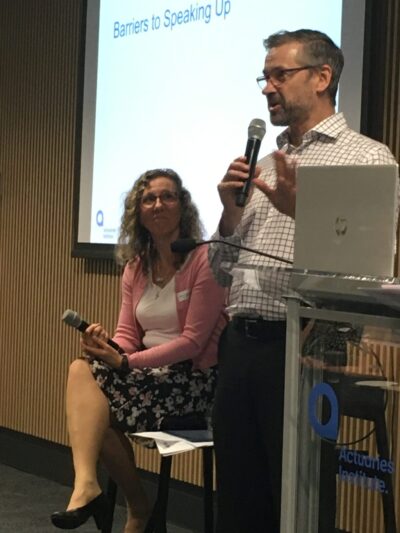
I Wish I’d Spoken Up – Why Didn’t I?
Ever notice the intense exchanges on the football field? Players animatedly directing each other to where they should have been but weren’t?
Or perhaps you’ve been behind the scenes with a music group when someone called out mistakes in a song? It’s a scene we’re all familiar with in sports and other such fields. But have you ever seen an actuary do the same?
In a recent Insights Sessions, The Ethics of Speaking Up, we demonstrated when it is required to speak up, and rehearsed how you could go about it.

The Code of Conduct requires that “Members will appropriately respond to non-compliance by others.” The shorthand for this is “speak up”. This can be difficult, both with regards to recognising when to do so and how to do it, but it’s nevertheless a requirement of every Actuaries Institute Member.
“Speaking up” is usually not as dramatic as having to “whistle-blow”, although it may lead to whistleblowing if the public interest at large is threatened, and other channels for a solution have been exhausted. While important, this is not common.
“Speaking up” more commonly refers to situations where problems are identified which ought not be swept under the rug, but raising them with the relevant people can be awkward, or difficult. However, our Code of Conduct requires us to deal constructively with such situations.
During the Insights Session, Stuart Turner and Saffron Sweeney shared two separate case studies, to discuss if, how and why the Code could apply.
The first was a video from the IFoA, where a more senior person chose not to inform a Board of the material uncertainties identified in an actuarial report prepared by her staff. The difficulties faced by junior staff in that situation are real, but so is the requirement to find a way to speak up. Participants of the Insights Session brainstormed several constructive “speak up” approaches in case they were ever in this situation, making it easier to face.
The second case study involved a member learning of a potential conflict of interest caused when two partners in a firm were rumoured to be newly romantically involved, while servicing companies on opposite sides of a confidential deal.
In addition to the conflict of interest was the breach of confidentiality that identified the deal the partners were associated with. Again, a difficult situation, yet the Code of Conduct requires a response from the member involved. Amongst sympathetic discussion of the situation that hypothetical member was facing, the audience found several very constructive approaches they could take.
Throughout the discussion of these specific scenarios, the session covered some of the barriers when speaking up. While it’s easy to identify these ethical issues in a hypothetical case study, factors such as group dynamics, workplace culture and power structures, can make doing so much harder in reality.
As leaders, being more conscious of these barriers can make people more comfortable in raising questions and concerns within organisations.
The Institute has acquired the rights to a number of IFoA case study videos, for you to use all year round. This is a great way to build your understanding of ethical actuarial behaviours, whether personally or working with your colleagues, to explore challenging scenarios.
See the Actuaries Institute website to access the videos. There’s also an article explaining how to facilitate a group discussion session in your organisation.
The Insights Session offered those in attendance a more concrete understanding of the requirement to “speak up”, and practical ways to do so no matter what the situation. For those who weren’t there, I encourage you to join us at our next session, Dealing with Ethics and the Code of Conduct, where we will be reviewing another set of ethical dilemmas. Registrations for this Insights Session will be open in the upcoming weeks.
CPD: Actuaries Institute Members can claim two CPD points for every hour of reading articles on Actuaries Digital.






